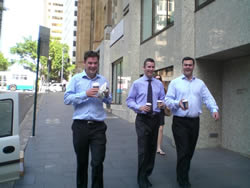Laura Stack* says that morning caffeine hits are standard office practice around the world and if used wisely, can really help improve performance.
 While not all office workers drink coffee, the clear majority imbibe some form of caffeine; and woe betide anyone who breaks the office coffee pot.
While not all office workers drink coffee, the clear majority imbibe some form of caffeine; and woe betide anyone who breaks the office coffee pot.
If you don’t drink caffeine in the morning, you’re one of the few and the proud.
I salute you — as long as you don’t get between me and my Keurig.
Tongue out of cheek, caffeine — most often in the form of coffee, tea, or soda — is actually a useful tool for boosting alertness and productivity.
It doesn’t just perk you up; it also enhances your motor skills, improves cognitive performance, decreases mental fatigue and increases the efficiency of your daily energy expenditure.
While you can overdo it and end up with a caffeine crash — it’s legal, socially acceptable, and it tastes good. All good stuff.
Each time a neuron in your brain fires, it produces a neurochemical called adenosine.
The more adenosine your brain absorbs, the more tired you get.
Eventually, it puts you to sleep.
Caffeine keeps your brain from absorbing adenosine, up to a point.
Eventually, it gives in and lets your brain absorb the chemical.
Meanwhile, theobromine, an important chemical in chocolate also found in most caffeinated drinks, triggers tiredness about half an hour after you have the drink.
The secret for effective caffeine usage is to drink your coffee, tea, or soda strategically.
For the best effects (since you’re probably going to drink it in some form), here are some suggestions.
Take a caffeine vacation:
If you want the best possible productive enhancement from your caffeine, reduce your intake for a week.
That will give your system a little time to flush out any existing caffeine, overcome its effects, and regain some sensitivity to it.
By the time you start your normal levels again, caffeine will be more effective and give your productivity (and alertness) a noticeable boost.
If you follow the remaining rules, you can maintain this caffeine streak indefinitely.
Drink water first and often:
Before you drink your first cup of brew in the morning, down a cup of water first.
Then drink at a cup of water for every cup of caffeinated beverage to stay consistently hydrated.
Don’t drink it immediately upon rising:
Assuming you’re adapted for the standard day shift, you don’t need caffeine until after about 9am.
That’s when the stress hormone cortisol, which gives you an alertness kick, hits its peak.
Caffeine can interfere with your cortisol cycle (another reason water needs to come before caffeine).
So, wake up a bit and then add the caffeine about 60 to 90 minutes later.
Drink less overall:
If you want to maintain your caffeine boost, don’t drink your drink all at once.
Instead, spread out the same consumption across the workday, so you can keep a consistent level of caffeine in your system.
Know your cut-off time so it doesn’t keep you up at night.
Drink it black:
If you can stand it (some of us can’t) drink your caffeine without any additives, especially sugar.
Sugar has its own cascade of effects that may either stack with or interfere with caffeine’s effects.
Low- or no-calorie sweeteners are okay, as well as some milk or low-cal creamer if you wish.
Eat well:
Maintain as healthy a diet as possible.
A well-balanced meal of protein and complex carbohydrates will improve caffeine’s effects, since it doesn’t need to compete with junk in your bloodstream.
For many of us, getting a cup of a refreshing, hot, caffeinated beverage first thing in the morning is a welcome ritual that helps us get our motors running.
Is it a crutch?
Maybe, but it’s a gentler one than most, and offers a proven way to ratchet up your productivity as your physical processes, like adenosine production, work to ratchet it down.
You can put caffeine to work effectively if you follow the simple rules I’ve listed above.
* Laura Stack is a speaker and author specialising in productivity and performance. She has written seven books, including her latest: Doing the Right Things Right: How the Effective Executive Spends Time. She can be contacted at theproductivitypro.com.
This article first appeared on Laura’s blogsite.











